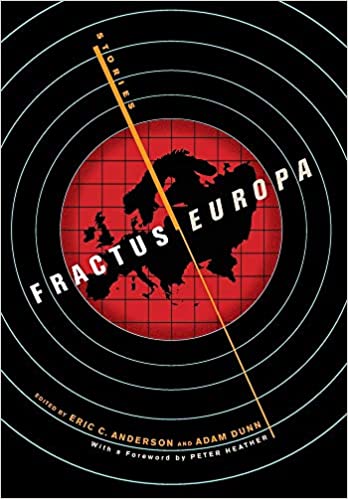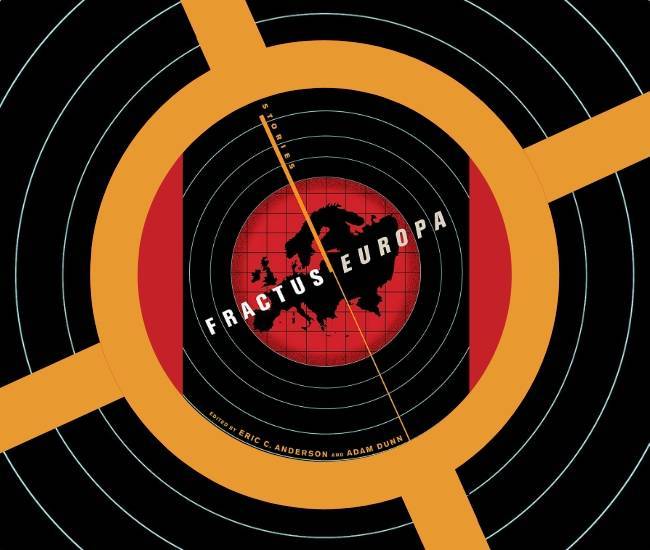Fractus Europa by Peter Heather, Daria , Eric C. Anderson
If there’s any part of our world that’s undergone major upheaval in the last few decades, it’s Europe. Communism’s collapse and its fallout, the formation of the EU, the rise of international terrorism, refugees wanting in, countries wanting out — the Eurozone has been in a state of constant geopolitical flux. Where is it all heading? That’s what the anthology of short stories, Fractus Europa (Dunn Books), strives to answer.
Edited by the late Eric Anderson (author of the “New Caliphate” trilogy) and Adam Dunn (author of the “More” series), and written by international journalists and subject-matter experts — some of whom do so under mysterious circumstances — these ten stories bear witness to a near-future world amid changes that are already underway. While the anthology covers a wide territory of issues from a variety of vantage points, one fairly continuous thread is the effect it all has on corrupting not only those in power, but also the average person.
Most of the characters in the stories don’t start off so bad, but through a combination of circumstances, weaknesses and bad decisions, they wind up in moral deep water. Whether well-meaning, desperate for survival or simply hapless, they could as easily be you or me. That’s perhaps even more frightening than the premises of the stories themselves.
Here’s a quick rundown:
Belgium: The Paper Trap by Conrad Zielan
Written under a pseudonym by an investigative journalist involved in reporting on drug trafficking, the slave trade and political corruption, “The Paper Trap” follows an assassin and his mark, a Belgian diplomat unwittingly embroiled in political intrigue in the Congo. With alternating viewpoints, the story unfolds to a turn of events that will make them unlikely and uneasy allies.
Germany: Shifting Syrian Sands by Constantine Bouchagiar
On the moral corruption front, this story is the most straightforward. A Syrian refugee starts off admirably enough with a keen entrepreneurial mind and desire to help his fellow asylum-seekers. Slowly his business dealings and enterprises become shadier and shadier and his motives far less charitable. It makes for a fascinating character study, as well as an engrossing tale.
The Baltics: The Promised Land by Preston Smith
This espionage thriller features a former narcotics agent with a new job investigating the business practices of some pretty dicey companies. Along the way, he becomes entangled in a human trafficking plot on the Latvian-Russian border and party to a betrayal you won’t see coming. A solid story with a great twist ending, this one is authored by another high-stakes investigative journalist on dangerous beats involving international crime.
Estonia: When Moscow Comes Calling by Peter Galuszka
The author and the protagonist of his story share a history — as American journalists working out of Moscow. Reporter Kirk Palmer dashes off to Estonia to cover the country’s invasion by Russia and ends up not only in the thick of the fight but as a key player in international intrigue that makes you wonder where his allegiances really lie. Be sure you don’t get interrupted while reading this one — it’s a page-turner.
Hungary: The Director by David J. Doesser
Poor, hapless Egon. He’s a factory middle manager that comes to work one day to discover his company has changed hands. All the bigwigs get fired and he suddenly finds himself in the managing director’s chair. And it’s a cushy one at that — all he has to do is sign some papers and hobnob with members of his new social class. You know what they say about opportunities that sound too good to be true? Yup. Poor Egon. Written by a former Hungarian intelligence officer whose current location is listed as “undisclosed.”
Ukraine: Frontier sans Medicine by Daria Sapenko
A soldier returns from the Russian-Ukraine conflict to a bad job market and no money for the medical school he dreams of attending. But he does have access to arms, thanks to his military status. What starts as a way to make ends meet becomes an illicit gun-running empire that eventually sends his country’s rate of violent crime through the roof. Another author writing under mysterious circumstances, Sapenko is a journalist last heard from in the Russian-occupied Donbass region of Ukraine.
Cyprus: Beaches and Banks by Graham Thomas
Written by a subject-matter expert in finance and money laundering, this story would make a fantastic movie. Tom and Bob are expats working in the Cyprus banking industry. Tom works for a Cypriot bank setting up its anti-money-laundering systems. Bob is a banking auditor working as a consultant for KPMG. They are the best of friends until Bob is reassigned to Tom’s bank and discovers some, shall we say, accounting irregularities. I won’t tell you how it ends, but I will say that it’s full of tragic irony that’s as horrifying to watch as a train wreck.
Ireland: Ode to a River by Fergal Parkinson and Preston Smith
A police detective in Ireland with family ties to Protestant factions is forced into an investigation of a fuel smuggling ring that tests his personal allegiances. Called to the job by the MI6, he tracks down the ringleader only to wind up in a harrowing getaway scheme. A collaboration between two veteran journalists with an ending that defies reader expectations to shocking effect.
Scotland: Prose and Politics by Nick Eaden
Russian hackers begin a misinformation campaign to convince a powerful Scottish politician that there is an untapped natural gas source in the North Sea. It’s one that could yield enough economic stability for the country to finally cut ties with England and gain a seat at the table in Europe. A new bid for Scottish independence is set in motion — and disaster waits in the wings.
England: Medical Care sans Money by Peter Heather
In post-Brexit England, a hospital administrator struggles to keep his facility afloat amid a crumbling NHS. Protagonist Dr. Jonathan Lawrence is perhaps the most heroic of the embattled characters in these stories, but, alas, every man has his breaking point. He puts up a really good fight though. The author of the story also provides a highly informative forward to the book that lays the historical groundwork for several of the pieces.
The anthology closes with an afterword by Anderson that puts it all into the perspective of the state of democracy and capitalism in the region, an essay that gives much food for thought — and reason to worry.
All told, the stories collected in Fractus Europa give us a preview of a world that could look very different very soon — and leave us to wonder whether we ourselves could be so malleable to its influence.





